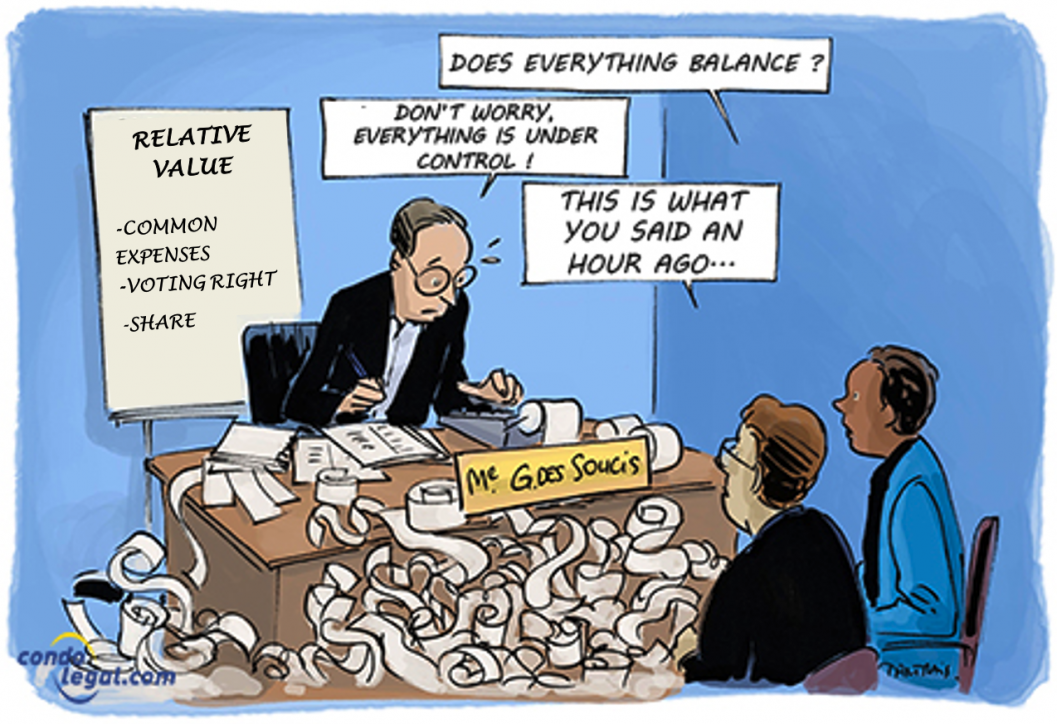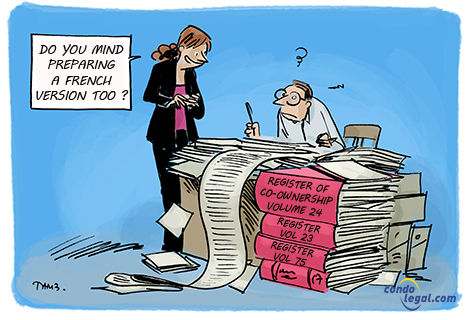 Any co-owner may have the relative value of their fraction, as well as the allocation of common expenses (condo fees), revised according to certain conditions and formalities. To do so, it is necessary to proceed with an appeal to revise the relative value of the fractions. Furthermore, a co-owner may wish to modify the relative value of their fraction. Therefore, they will have to request the prior consent of the Board of directors or the general meeting of the co-owners, depending on what is required.
Any co-owner may have the relative value of their fraction, as well as the allocation of common expenses (condo fees), revised according to certain conditions and formalities. To do so, it is necessary to proceed with an appeal to revise the relative value of the fractions. Furthermore, a co-owner may wish to modify the relative value of their fraction. Therefore, they will have to request the prior consent of the Board of directors or the general meeting of the co-owners, depending on what is required.
This revision or modification of the relative value has an impact on the proportionate share of the right of ownership (which the co-owners hold in the common portions), the number of votes they can cast at the meeting of co-owners and the allocation of common expenses. On this question, article 1064 of the Civil Code of Québec stipulates that: “Each co-owner contributes to the common expenses in proportion to the relative value of his fraction.”
Method Used to Establish Relative Values
The constituting act of co-ownership determines the relative value of each fraction. It also indicates the method used to establish it. The person who drafts the Declaration of Co-Ownership must indicate the weighting of the criteria listed in article 1041 of the Civil Code of Québec , without providing, in detail, the calculations and considerations which led to the final establishment of the relative value.
In this regard, article 1041 of the Civil Code of Québec provides that the relative value of each fraction of a divided co-ownership is established (without considering its use) according to the value of all the fractions, considering the following elements:
The declarant must assess every private portion on the same date. It generally establishes a theoretical marketing price for each unit on the basis of the foregoing, i.e. with the same criteria as those set out in article 1041 of the Civil Code of Québec. Once done, it compares these theoretical marketing prices with each other to calculate the relative value of each fraction.
That said, sometimes relative values and the resulting allocation of common expenses are incorrect, hence the possibility given to co-owners who request a review by a court, under certain conditions.
Judicial Review
Each co-owner may apply to the court to review the relative value of the fractions and the allocation of common expenses. This legal proceeding is provided for in article 1068 of the Civil Code of Québec. It must be instituted, under penalty of forfeiture, within five years from the date of registration of the declaration of co-ownership. Once this 5-year period has elapsed, the recourse becomes inadmissible. For it to be possible, the relative value given to a fraction or share of the common expenses must also be too high (or too low), in a proportion of more than one-tenth, according to the criteria set out in the declaration of co-ownership.
In fact, this value is presumed to be valid and the co-owner who contests it must demonstrate the difference, which can prove to be a very heavy burden, given that the evaluation criteria includes a subjective assessment. This assessment is left to the discretion of the person drafting the declaration of co-ownership. However, in cases where the constituting act of co-ownership is silent on the method applied, the syndicate or the co-owners concerned must show that the relative value of the fractions has been calculated reasonably, but also in accordance with the criteria of article 1041 of the Civil Code of Québec.
This type of recourse is exercised by means of a demand initiating proceedings addressed to the syndicate of co-owners. Within five days following the service of this legal proceeding, the syndicate is obliged to notify all co-owners. Since the consequences of a judgment under review could affect their rights (different allocation of relative values, allocation to common expenses and distribution of voting rights at the meeting), intervention in the debate by any interested co-owner should be authorized. Finally, it should be noted that a court's decision regarding the revision of the relative value of fractions and the allocation of common expenses is valid only for the future. It is not retroactive.
Modification by the meeting of co-owners or the board of directors
There are other situations that will lead to a change in the relative values initially provided for in the Declaration of Co-ownership. This change may occur following the division of an apartment. The new relative values resulting from the division of a private portion may be adopted (by the meeting of co-owners) by the majority provided for in article 1097 of the Civil Code of Québec. Work carried out within a private portion may also require a modification of the relative value of a fraction. For example, a co-owner may enlarge their dwelling, after having obtained the authorization of the general meeting of co-owners. This could be the enlargement of a townhouse (private portion) in a horizontal co-ownership.
Changes to the configuration of the premises may also justify the creation of new lots, and thus new relative values assigned to the targeted private portions. Hence, co-owners of contiguous private portions may, with the agreement of the Board of Directors and the hypothecary creditors concerned, modify the boundaries of their private portions. As this change does not affect the relative value of all the modified private portions, it does not require the authorization of the general meeting of co-owners. When it is validly made, the syndicate has only to amend the Declaration of Co-ownership and the cadastral plan at the expense of the co-owners. A certified copy of each of the fractions shall be given to the co-owner at their expense, unless the general meeting of co-owners decides otherwise. In accordance with the law, the Deed of Amendment must be accompanied by the consents of the creditors and co-owners concerned.
Formalities
The change to the relative value requires an amendment to the declaration of co-ownership. The constituting act of co-ownership will have to be adjusted to reflect the new relative values. Such an amendment to the Declaration of Co-Ownership must generally be authorized by a vote at a meeting of the co-owners. This question must be placed on the agenda of the meeting of co-owners. Article 1087 of the Civil Code of Québec provides that the notice of meeting must be accompanied by the proposed amendment to the declaration. When an amendment to the Declaration of Co-Ownership has been voted on by the general meeting of co-owners, it does not become effective immediately, because it must be received by a notary (notarial act) and registered with the land register. The (notarial) deed of amendment must be registered under the registration number of the common areas and that of a private portion, if the latter is directly affected.
 WHAT YOU SHOULD KNOW! The legal proceeding for revision must be brought against the syndicate of co-owners, which is obligated to notify each co-owner within five days of the notification. Given the potential impacts on their rights, the intervention in the legal proceeding by any interested co-owner should be allowed.
WHAT YOU SHOULD KNOW! The legal proceeding for revision must be brought against the syndicate of co-owners, which is obligated to notify each co-owner within five days of the notification. Given the potential impacts on their rights, the intervention in the legal proceeding by any interested co-owner should be allowed.
 WHAT TO KEEP IN MIND: The Court of Appeal has rendered a judgment on the importance of detailing, during the drafting of a Declaration of Co-Ownership, the method for establishing the relative value of the private portion, as well as the way the various evaluation criteria was considered.
WHAT TO KEEP IN MIND: The Court of Appeal has rendered a judgment on the importance of detailing, during the drafting of a Declaration of Co-Ownership, the method for establishing the relative value of the private portion, as well as the way the various evaluation criteria was considered.
 WARNING! Article 1102 of the Civil Code of Québec stipulates that « Any decision of the syndicate which, contrary to the declaration of co-ownership, imposes on a co-owner a change in the relative value of his fraction (...) is without effect. » Consequently, to modify in a conventional manner the relative value of all or part of the fractions of the co-ownership, it is necessary to obtain the approval of each of the co-owners concerned by the modification.
WARNING! Article 1102 of the Civil Code of Québec stipulates that « Any decision of the syndicate which, contrary to the declaration of co-ownership, imposes on a co-owner a change in the relative value of his fraction (...) is without effect. » Consequently, to modify in a conventional manner the relative value of all or part of the fractions of the co-ownership, it is necessary to obtain the approval of each of the co-owners concerned by the modification.







